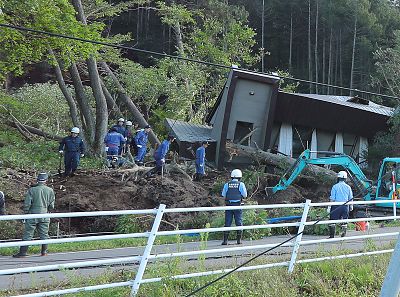Nearly all of the 2.9 million households on the island of Hokkaido were without power.
TOKYO — A powerful earthquake hit wide areas of Japan's northernmost main island, Hokkaido, early Thursday, triggering landslides, knocking out power to nearly 3 million households and causing a nuclear power plant to go on a backup generator.
The magnitude-6.7 earthquake struck southern Hokkaido at 3:08 a.m. Thursday (2:08 p.m. ET Wednesday) at a depth of about 25 miles, the Japan Meteorological Agency said. The U.S. Geological Survey put the magnitude at 6.6. No tsunami warning was issued.
The quake's epicenter was east of the city of Tomakomai. It also struck Hokkaido's prefectural capital, Sapporo, which has a population of 1.9 million.
The Fire and Disaster Management Agency said that a man was found without vital signs in Tomakomai and that several people were reported missing in the nearby town of Atsuma. At least 20 other people were injured in nearby towns; their conditions weren't immediately known.
The quake struck as Japan was already dealing with the effects of Typhoon Jebi, the strongest typhoon to hit Japan in 25 years, which killed at least 11 people on Wednesday.
Video on NHK national television showed the moment the quake struck Muroran, with its camera violently shaking and all city lights going out a moment later. In nearby Sapporo, a mudslide hit a road, half-burying several cars.
Economy, Trade and Industry Minister Hiroshige Seko told reporters that the extensive power loss was caused by an emergency shutdown of the main thermal power plant that supplies half the electricity to Hokkaido.
Authorities sent power-generator vehicles to hospitals so they could accept emergency patients, he said.
In the town of Atsuma, a massive landslide occurred on the side of a mountain, crushing houses at lower grounds.
Chief Cabinet Secretary Yoshihide Suga said at a news conference that authorities had received hundreds of calls about people missing and buildings' collapsing. The central government set up a crisis management task force at the prime minister's Office.
Prime Minister Shinzo Abe said at a task force meeting that 4,000 self-defense troops were being deployed on Hokkaido to join search-and-rescue operations. The government will send 20,000 more to the affected sites, he said.
Three reactors at the Tomari nuclear plant were running on backup generators after they lost external power because of the island-wide blackouts, which knocked out power at all 2.9 million households, Japan's Nuclear Regulation Authority said. Spent fuel in storage pools was safely cooled on backup power that can last for a week, the agency said.












